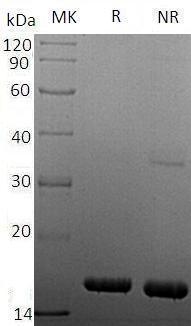-
Product Name
Human TNF/TNFA/TNFSF2 (His tag) recombinant protein
- Documents
-
Description
Tumor Necrosis Factor-α (TNF-α) is secreted by macrophages, monocytes, neutrophils, T-cells, and NK-cells following stimulation by bacterial LPS. Cells expressing CD4 secrete TNF-α while cells that express CD8 secrete little or no TNF-α. Synthesis of TNF-α can be induced by many different stimuli including interferons, IL2, and GM-CSF. The clinical use of the potent anti-tumor activity of TNF-α has been limited by the proinflammatory side effects such as fever, dose-limiting hypotension, hepatotoxicity, intravascular thrombosis, and hemorrhage. Designing clinically applicable TNF-α mutants with low systemic toxicity has been of intense pharmacological interest. Human TNF-α that binds to murine TNF-R55 but not murine TNF-R7, exhibits retained anti-tumor activity and reduced systemic toxicity in mice compared with murine TNF-α, which binds to both murine TNF receptors. Based on these results, many TNF-α mutants that selectively bind to TNF-R55 have been designed. These mutants displayed cytotoxic activities on tumor cell lines in vitro and have exhibited lower systemic toxicity in vivo. Recombinant Human TNF-α High Active Mutant differs from the wild-type by amino acid subsitution of amino acids 1-7 with Arg8, Lys9, Arg10 and Phe157. This mutant form has been shown to have increased activity with less inflammatory side effects in vivo.
-
Protein name
tumor necrosis factor(TNF)
-
Protein short names
TNFA; TNFSF2
-
Uniprot ID
P01375
-
Source/Expression Host
E. coli
-
Expression Plasmid/cDNA
A DNA sequence encoding the Human TNF/TNFA/TNFSF2 Val77-Leu233 is expressed with a 6His tag at the C-terminus.
-
Protein Species
Human
-
Purity
>95% as determined by SDS-PAGE.
-
Validations

Human TNF/TNFA/TNFSF2 (His tag) recombinant protein
Related Products / Services
Please note: All products are "FOR RESEARCH USE ONLY AND ARE NOT INTENDED FOR DIAGNOSTIC OR THERAPEUTIC USE"
